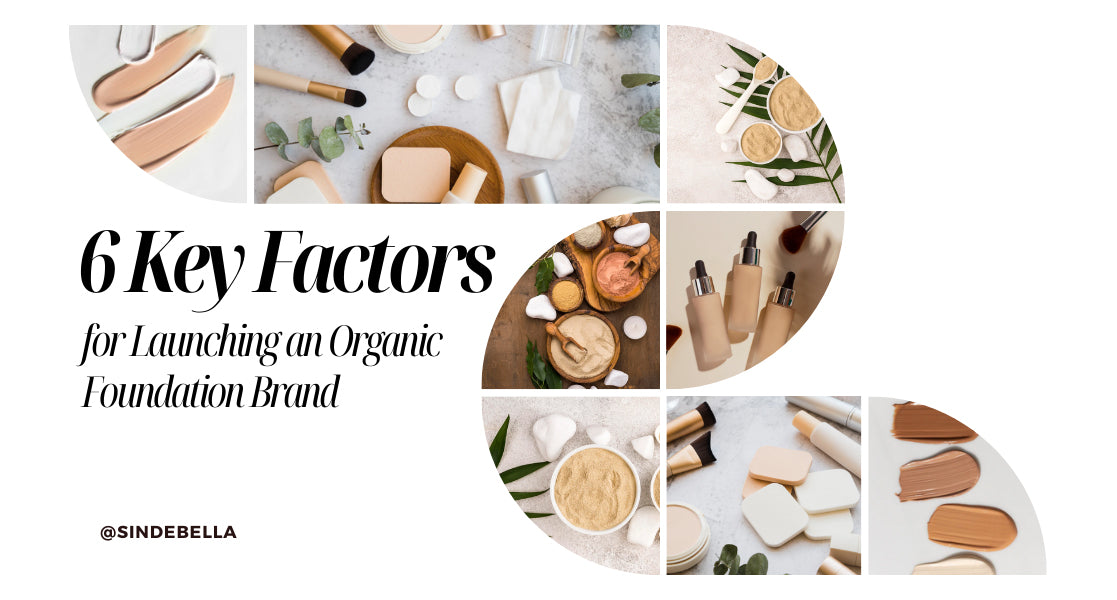
Top 6 Key Factors Preparing to Launch Your Own Organic Foundation Brand
Introduction:
In recent years, there has been an increasing demand for organic beauty products, including foundation. Organic foundation is formulated with natural and eco-friendly ingredients, offering a greener and healthier alternative to conventional foundations. In this blog post, we will delve into the formulation and usage of organic foundation, highlighting its differences compared to regular foundation, as well as its pros and cons.
Formulation:
1. Ingredients: Organic foundation is typically made from plant-based and naturally-derived ingredients. These can include botanical extracts, essential oils, mineral pigments, and moisturizing agents. On the other hand, regular foundations often contain synthetic chemicals, preservatives, and artificial colorants.
2. Chemical-free: Organic foundations are free from harmful chemicals such as parabens, phthalates, and sulfates. They are also often cruelty-free and vegan-friendly, appealing to those with ethical concerns.
3. Skin-friendly: Organic foundation is known for being gentle on the skin and suitable for all skin types, including sensitive or acne-prone skin. Its natural ingredients help to nourish and protect the skin without causing irritation or clogging pores.
Pros of Organic Foundation:
1. Healthier for the skin: By using organic foundation, you are minimizing your exposure to potentially harmful chemicals that can be absorbed by the skin.
2. Environmentally friendly: The use of natural and sustainably sourced ingredients in organic foundation contributes to a healthier planet by reducing the release of toxic substances into the environment.
3. Suitable for sensitive skin: Organic foundation's gentle formulation makes it suitable for individuals with sensitive skin, as it reduces the risk of irritation and allergic reactions.
Cons of Organic Foundation:
1. Limited shade range: Organic foundations may come in a more limited shade range compared to conventional ones. However, brands are increasingly expanding their offerings to cater to a wider range of skin tones.
2. Organic formulas may have less coverage, longevity, and waterproofness than the regular foundations.
3. Shorter shelf life: Due to the absence of synthetic preservatives, organic foundations may have a shorter shelf life compared to regular foundations. It is important to check the expiration date and use the product within the recommended timeframe.
Preparing to Launch Your Own Organic Foundation Brand
If you are considering launching your own organic foundation brand, there are several key preparations you should make to ensure a successful and sustainable venture. Here are some important steps to consider:
1. Research and Development:
- Conduct thorough market research to understand consumer preferences, trends, and demands in the organic beauty industry.
- Invest in extensive research and development to formulate a unique, high-quality organic foundation with effective performance and desirable features.
- Collaborate with cosmetic chemists and experts to create a stable and safe formula that meets organic certification standards.
2. Sourcing Organic Ingredients:
- Establish relationships with trusted suppliers of organic and sustainably sourced ingredients.
- Ensure that your suppliers adhere to rigorous quality control and ethical practices, as transparency is essential when marketing an organic product.
- Obtain necessary certifications, such as USDA Organic or COSMOS, to authenticate the organic nature of your ingredients and products.
3. Brand Identity and Packaging:
- Develop a compelling and coherent brand identity that reflects the values of your organic foundation line.
- Design eye-catching and eco-friendly packaging that aligns with your brand's vision and resonates with environmentally conscious consumers.
- Consider incorporating recycled materials, biodegradable packaging, or refillable options to further enhance your brand's sustainability credentials.
4. Compliance and Certification:
- Ensure compliance with relevant regulations and standards specific to the cosmetics industry, both domestically and internationally.
- Seek certification from recognized organic certifying bodies to provide assurance to consumers that your product is genuinely organic.
- Keep up-to-date with evolving regulations related to labeling, ingredient listings, and manufacturing practices to maintain compliance.
5. Marketing and Distribution:
- Develop a comprehensive marketing strategy to build brand awareness and promote your organic foundation.
- Leverage social media platforms, influencers, and organic beauty communities to reach your target audience.
- Explore partnerships with reputable retailers or e-commerce platforms specialized in organic or clean beauty products to expand your distribution channels.
6. Consumer Education:
- Educate your target market about the benefits and limitations of using organic foundation, including its natural ingredients and health-conscious formulation.
- Provide clear and transparent information about your brand's commitment to sustainability, ethical sourcing, and cruelty-free practices.
- Offer product demonstrations, tutorials, and informative content to help consumers understand how to best use and incorporate your foundation into their skincare routine.
Launching your own organic foundation brand requires careful planning, dedication, and a strong commitment to quality and sustainability. By following these preparatory steps, you will be on your way to creating a successful brand that caters to the growing demand for organic beauty products.
In recent years, there has been an increasing demand for organic beauty products, including foundation. Organic foundation is formulated with natural and eco-friendly ingredients, offering a greener and healthier alternative to conventional foundations. In this blog post, we will delve into the formulation and usage of organic foundation, highlighting its differences compared to regular foundation, as well as its pros and cons.
Formulation:
1. Ingredients: Organic foundation is typically made from plant-based and naturally-derived ingredients. These can include botanical extracts, essential oils, mineral pigments, and moisturizing agents. On the other hand, regular foundations often contain synthetic chemicals, preservatives, and artificial colorants.
2. Chemical-free: Organic foundations are free from harmful chemicals such as parabens, phthalates, and sulfates. They are also often cruelty-free and vegan-friendly, appealing to those with ethical concerns.
3. Skin-friendly: Organic foundation is known for being gentle on the skin and suitable for all skin types, including sensitive or acne-prone skin. Its natural ingredients help to nourish and protect the skin without causing irritation or clogging pores.
Pros of Organic Foundation:
1. Healthier for the skin: By using organic foundation, you are minimizing your exposure to potentially harmful chemicals that can be absorbed by the skin.
2. Environmentally friendly: The use of natural and sustainably sourced ingredients in organic foundation contributes to a healthier planet by reducing the release of toxic substances into the environment.
3. Suitable for sensitive skin: Organic foundation's gentle formulation makes it suitable for individuals with sensitive skin, as it reduces the risk of irritation and allergic reactions.
Cons of Organic Foundation:
1. Limited shade range: Organic foundations may come in a more limited shade range compared to conventional ones. However, brands are increasingly expanding their offerings to cater to a wider range of skin tones.
2. Organic formulas may have less coverage, longevity, and waterproofness than the regular foundations.
3. Shorter shelf life: Due to the absence of synthetic preservatives, organic foundations may have a shorter shelf life compared to regular foundations. It is important to check the expiration date and use the product within the recommended timeframe.
Preparing to Launch Your Own Organic Foundation Brand
If you are considering launching your own organic foundation brand, there are several key preparations you should make to ensure a successful and sustainable venture. Here are some important steps to consider:
1. Research and Development:
- Conduct thorough market research to understand consumer preferences, trends, and demands in the organic beauty industry.
- Invest in extensive research and development to formulate a unique, high-quality organic foundation with effective performance and desirable features.
- Collaborate with cosmetic chemists and experts to create a stable and safe formula that meets organic certification standards.
2. Sourcing Organic Ingredients:
- Establish relationships with trusted suppliers of organic and sustainably sourced ingredients.
- Ensure that your suppliers adhere to rigorous quality control and ethical practices, as transparency is essential when marketing an organic product.
- Obtain necessary certifications, such as USDA Organic or COSMOS, to authenticate the organic nature of your ingredients and products.
3. Brand Identity and Packaging:
- Develop a compelling and coherent brand identity that reflects the values of your organic foundation line.
- Design eye-catching and eco-friendly packaging that aligns with your brand's vision and resonates with environmentally conscious consumers.
- Consider incorporating recycled materials, biodegradable packaging, or refillable options to further enhance your brand's sustainability credentials.
4. Compliance and Certification:
- Ensure compliance with relevant regulations and standards specific to the cosmetics industry, both domestically and internationally.
- Seek certification from recognized organic certifying bodies to provide assurance to consumers that your product is genuinely organic.
- Keep up-to-date with evolving regulations related to labeling, ingredient listings, and manufacturing practices to maintain compliance.
5. Marketing and Distribution:
- Develop a comprehensive marketing strategy to build brand awareness and promote your organic foundation.
- Leverage social media platforms, influencers, and organic beauty communities to reach your target audience.
- Explore partnerships with reputable retailers or e-commerce platforms specialized in organic or clean beauty products to expand your distribution channels.
6. Consumer Education:
- Educate your target market about the benefits and limitations of using organic foundation, including its natural ingredients and health-conscious formulation.
- Provide clear and transparent information about your brand's commitment to sustainability, ethical sourcing, and cruelty-free practices.
- Offer product demonstrations, tutorials, and informative content to help consumers understand how to best use and incorporate your foundation into their skincare routine.
Launching your own organic foundation brand requires careful planning, dedication, and a strong commitment to quality and sustainability. By following these preparatory steps, you will be on your way to creating a successful brand that caters to the growing demand for organic beauty products.




